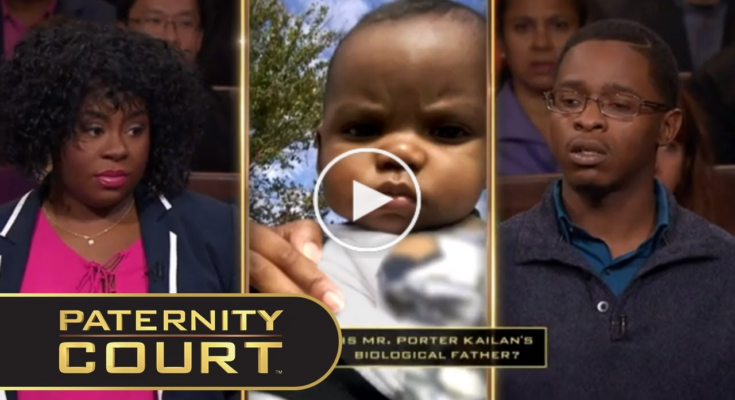The courtroom was abuzz with tension as ‘King v. Porter’ commenced, unraveling a challenging paternity dispute involving three-year-old Kailan. Solisha King, seeking to prove George Porter’s paternity, and George, hesitant due to past mistrust and potential lead poisoning affecting his fertility, stood at the heart of this emotional rollercoaster.
Ms. King’s determination to establish George as the father was evident as she declared, “My son deserves to have a father listed on his birth certificate.” The courtroom palpably felt the weight of her emotions, as she fought to prove Kailan’s rightful parentage. Yet, George’s doubts loomed large, shaped by past lies about pregnancies and mistrust. He candidly expressed, “I have doubt in my mind if I’m the father… That started off my doubt.”
Judge Lake recognized the significance of biological fatherhood for a child’s well-being, empathetically stating, “A lie cannot be your go-to when things don’t go the way you’d planned or the way you want or the way you think.” Her compassionate words seemed to resonate with the parties, as they grappled with the consequences of past actions.
George’s revelation about his history of lead poisoning added another layer of complexity to the case. Citing medical research, George presented evidence indicating that lead exposure during childhood might have affected his fertility. Dr. Samantha Brown-Parks shed light on this issue, explaining, “Lead exposure during childhood can disrupt genital development and hormonal pathways, potentially affecting fertility in adulthood.”
Amid the emotional turmoil, Dr. Brown-Parks emphasized, “It is absolutely possible as well” when asked if George could still be the father despite the lead poisoning concerns. The courtroom held its breath, understanding the magnitude of this revelation for George and his quest for fatherhood.
To resolve the paternity mystery conclusively, the court ordered a DNA test. The moment of truth arrived as the results were unveiled, and George’s face lit up with joy. The verdict confirmed him as Kailan’s biological father, marking a turning point in the case. George exuberantly expressed, “I’m happy. I’m super happy right now.” Tears of relief streamed down Ms. King’s face, and the courtroom witnessed the emotional release of pent-up feelings.
The revelation of paternity brought about an emotional reconciliation between the parties. Solisha King graciously accepted George’s apology, acknowledging the importance of honesty in co-parenting. She affirmed, “I accept your apology, and I knew he was yours.” The courtroom witnessed the power of forgiveness and the potential for healing even in the midst of past pain.
Though no longer a couple, they embraced co-parenting, with George passionately stating, “I’m his father, but I’m gonna do more. And I’m gonna step up to the plate more than I’m already doing.” The atmosphere was charged with hope for a future where Kailan would grow up surrounded by love and support.
Throughout the courtroom proceedings, emotions ran high, showcasing the complexities of paternity disputes. The relentless pursuit of truth intertwined with heartache and doubt, culminating in the dramatic revelation of the DNA test results. Witnessing the emotional transformation of George, from doubt and skepticism to joy and acceptance, was a poignant moment for all present.
For Solisha King, it was a bittersweet victory. Her unwavering determination to prove George as Kailan’s father highlighted the deep love she had for her son. Her tears of relief and the acknowledgment of George as the father brought a sense of closure to a long and arduous journey.
‘King v. Porter’ underscored the profound impact of truth, acceptance, and reconciliation on family dynamics. The courtroom, once a battleground of doubts and emotions, transformed into a space of resolution and hope, as Kailan found the love and care he deserved from both his parents.
The case also shed light on the potential long-term effects of lead poisoning on male fertility, emphasizing the importance of understanding environmental exposures during childhood and its implications on adulthood.
‘King v. Porter’ exemplified the intricate tapestry of paternity disputes and the profound impact of truth on relationships. The scientific resolution through DNA testing revealed George Porter as Kailan’s father, providing a foundation for rebuilding trust and establishing a co-parenting relationship. Moreover, the case illuminated the potential effects of lead poisoning on male fertility, underscoring the importance of understanding long-term consequences of environmental exposure during childhood.
In the end, the pursuit of truth and honesty emerged as the guiding beacons, fostering healthier relationships and nurturing the emotional well-being of the child involved. The courtroom, once a crucible of doubts and emotions, transformed into a haven of acceptance and reconciliation, demonstrating the immense power of truth to heal and unite.
As ‘King v. Porter’ concluded, it left a lasting impression on all those involved, highlighting the importance of transparency, compassion, and understanding in resolving paternity disputes. The emotional journey of this case serves as a powerful reminder of the profound impact of truth, acceptance, and reconciliation in the pursuit of justice and family harmony. Ultimately, Kailan’s well-being triumphed, paving the way for a brighter future, where love and support would define his upbringing.



